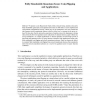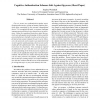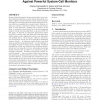53 search results - page 3 / 11 » Secure Commitment Against A Powerful Adversary |
111
click to vote
CORR
2011
Springer
14 years 8 months ago
2011
Springer
We propose a coin-flip protocol which yields a string of strong, random coins and is fully simulatable against poly-sized quantum adversaries on both sides. It can be implemented ...
109
click to vote
SP
2006
IEEE
15 years 7 months ago
2006
IEEE
Can we secure user authentication against eavesdropping adversaries, relying on human cognitive functions alone, unassisted by any external computational device? To accomplish thi...
164
click to vote
EUROCRYPT
2010
Springer
15 years 6 months ago
2010
Springer
Imagine many small devices send data to a single receiver, encrypted using the receiver’s public key. Assume an adversary that has the power to adaptively corrupt a subset of the...
114
click to vote
CCS
2008
ACM
15 years 3 months ago
2008
ACM
System-call monitoring has become the basis for many hostbased intrusion detection as well as policy enforcement techniques. Mimicry attacks attempt to evade system-call monitorin...
127
click to vote
TCC
2004
Springer
15 years 7 months ago
2004
Springer
Abstract. We present a general method to prove security properties of cryptographic protocols against active adversaries, when the messages exchanged by the honest parties are arbi...



